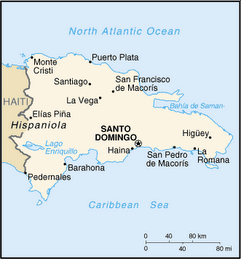My apologies for being so far behind. This is some information on Holy Week in the Dominican culture, in our Lutheran church, and for the mission families.
Dominican cultureHoly week (Semana Santa) is important in the Dominican Republic. The majority of people have vacation from school and work. Their focus is on Good Friday. This as an opportunity to point toward the empty tomb and share the good news, "Christ is risen! Yes! He is risen indeed!"
The pre-Lenten Carnival is the most popular festival in the DR. The tradition began in the 1600s when the people wore masks to mimic the custom practiced in Europe. Traditionally, this was a time of confession and “taking away flesh” in preparation for Christ’s passion. Today it has been mostly secularized. Colorful dance groups, floats, bands, and masked characters are featured in village square and parades of major cities every Sunday in February. Link to carnival:
http://www.colonialzone-dr.com/traditions-carnival.html
Sweet beans (habichuelas con dulce) are a traditional cuisine served often during the Lenten season. In the past, this sweet bean dish was eaten on Ash Wednesday and the Fridays of Lent as a substitute for meat. Each region of the island usually adds a special or secret ingredient to make their recipe distinct. Link to the recipe:
http://www.dominicancooking.com/desserts-beverages/1439-habichuelas-dulce-sweet-creamed-beans.htmlWith the Lutheran ChurchOn a Friday evening during Lent, one of the student pastors, Freddy, hosted a song service in his apartment. We sang hymns, shared special Bible passages and memories; Freddy also read a poem he prepared for the event. His wife, Elizabeth, and other members of the congregation spent the afternoon preparing a large kettle of “Habichuela con Dulce” for us to enjoy during the evening. It was warm and sweet!
English Easter Party -- At the end of this session of English classes, we had an English Easter party. An opportunity for students to spend time with our church members and ministry leaders. We began the day with socializing and playing games. Cards and dominoes are always on the top of the list. For children, two volunteers ran a craft room that kept the children busy for 3 hours. We served snacks consisting of chips, peanuts and raisins, grapes, apples, cookies and bars, and lemonade. We played JESUS Bingo, using English words connected to Jesus Christ. After several games, the day concluded with a video and Bible Study on "What Easter Means to Me". We had over 60 attendees with 39 staying for the Bible Study.

Services -- During holy week, the Haitian and Dominican congregations in Santiago had combined worship services on Maundy Thursday, Good Friday, and Easter Sunday. The congregations in Moca and San Pedro kept their regular schedules. Due to the influence of the Roman Catholic Church on Dominican society, most people consider Good Friday the focal point of Holy Week, with Easter Sunday and Christ’s resurrection as almost an afterthought. Every year the missionaries and national pastors encourage members to remember BOTH events for our salvation. With that encouragement, Easter attendance is slowly going up among our members.

Special orders of service were prepared for Thursday, Friday and Sunday. The service on Maundy Thursday led worshipers through personal preparation and examination before receiving the Lord’s Supper. The service on Good Friday focused on confession and the absolution that Christ’s death for us makes possible. Easter Sunday’s service was a joyous celebration of the victory Christ won for us. There was no special music like organ preludes or choir anthems because the national church has not yet been blessed with church musicians — we use recorded musical accompaniment — but even so the members tend to sing with a little extra emotion in their voice this time of year.
For the Mission TeamThe Dominican Republic does not have the same traditions for celebrating Easter as in the United States. In fact, Easter itself is almost not celebrated at all. As mentioned above, the emphasis here is on Good Friday. For many Dominicans, Easter Sunday is not for going to church to praise God for the resurrection and to celebrate new life in Christ, but for going to the beach or traveling to visit family. American traditions like the Easter Bunny, coloring Easter eggs or doing an Easter egg hunt are unheard of. When Missionary Wagenknecht offered some colored Easter eggs to his seminary students last year, they didn’t know what to do with them. “
Eat them??? They’ve been colored—are you sure they’re safe???”
Individual mission families may hold their family devotion early on Sunday morning to substitute for an Easter Sunrise Service (which is not a tradition here). Some bring Easter candy back with them from furlough and save it to hide for their children on Easter—they have to practice self-restraint not to use it up early if their furlough was the previous summer. In past years the mission families have joined together on Easter Sunday after church activities for an Easter brunch—but since that isn’t until the late afternoon, we affectionately call it “Easter brupper”.
No matter where we are or what the traditions are, it is a joy to celebrate Christ’s victory over Satan, death and sin. Christ is risen! He is risen indeed!
The Lord bless you with His peace,
NW






 Sweet beans (habichuelas con dulce) are a traditional cuisine served often during the Lenten season. In the past, this sweet bean dish was eaten on Ash Wednesday and the Fridays of Lent as a substitute for meat. Each region of the island usually adds a special or secret ingredient to make their recipe distinct. Link to the recipe: http://www.dominicancooking.com/desserts-beverages/1439-habichuelas-dulce-sweet-creamed-beans.html
Sweet beans (habichuelas con dulce) are a traditional cuisine served often during the Lenten season. In the past, this sweet bean dish was eaten on Ash Wednesday and the Fridays of Lent as a substitute for meat. Each region of the island usually adds a special or secret ingredient to make their recipe distinct. Link to the recipe: http://www.dominicancooking.com/desserts-beverages/1439-habichuelas-dulce-sweet-creamed-beans.html
 Special orders of service were prepared for Thursday, Friday and Sunday. The service on Maundy Thursday led worshipers through personal preparation and examination before receiving the Lord’s Supper. The service on Good Friday focused on confession and the absolution that Christ’s death for us makes possible. Easter Sunday’s service was a joyous celebration of the victory Christ won for us. There was no special music like organ preludes or choir anthems because the national church has not yet been blessed with church musicians — we use recorded musical accompaniment — but even so the members tend to sing with a little extra emotion in their voice this time of year.
Special orders of service were prepared for Thursday, Friday and Sunday. The service on Maundy Thursday led worshipers through personal preparation and examination before receiving the Lord’s Supper. The service on Good Friday focused on confession and the absolution that Christ’s death for us makes possible. Easter Sunday’s service was a joyous celebration of the victory Christ won for us. There was no special music like organ preludes or choir anthems because the national church has not yet been blessed with church musicians — we use recorded musical accompaniment — but even so the members tend to sing with a little extra emotion in their voice this time of year.
